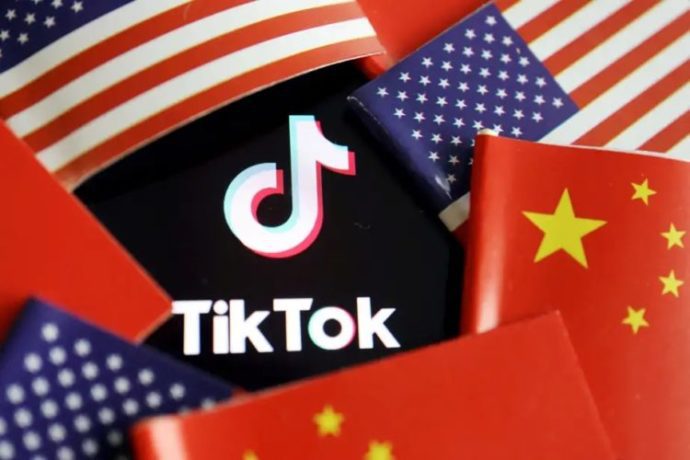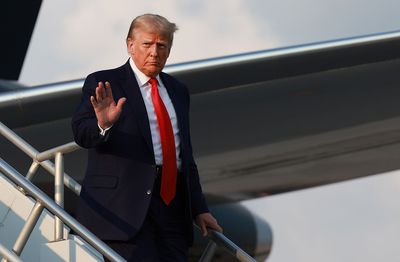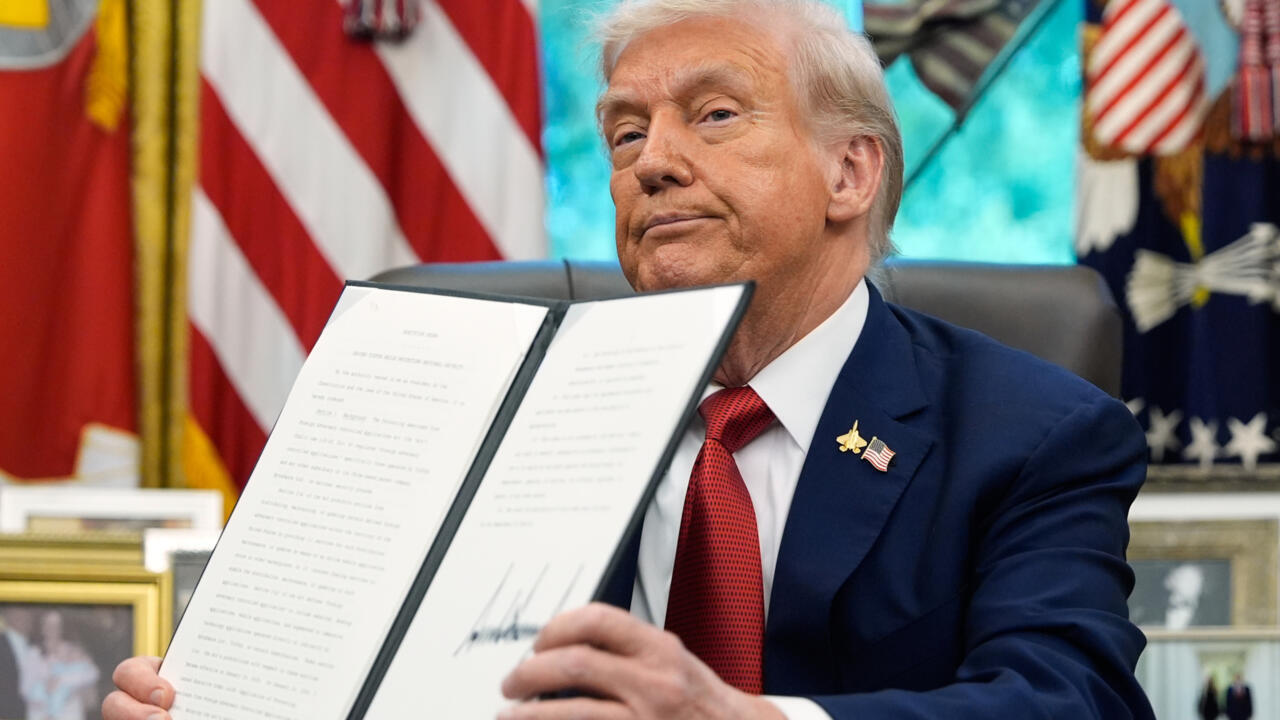× Expand Jaap Arriens/NurPhoto via AP
The first thing to say about the sale of TikTok to a still-undefined U.S. consortium is that everything about this episode has been rampantly illegal. The U.S. passed a law requiring the divestiture of TikTok from its Chinese parent company. There was a date certain for the divestiture—January 19—and one prescribed escape valve to extend the deadline a single time. Donald Trump did not use that prescribed provision, and instead unilaterally extended the deadline five times, including another 120-day delay established on September 25, essentially by saying his Justice Department would not enforce the law passed by Congress.
This isn’t a case of prosecutorial discretion, where you have some colorable justification to not prosecute someone violating the law. In this case, the law was just about Chinese-controlled social media platforms. TikTok is one, it has been for the entire time since the deadline passed, and the government made a collective agreement to just not care. The precedent of a president not enforcing laws they don’t like, and the president’s opponents deciding not to say anything about it because it’s politically inconvenient, will be quite dangerous when it’s extended to other laws.
More from David Dayen
That aside, what do we know about this deal? Not a whole lot, despite many media reports and a Trump executive order released last Thursday that effectively authorizes the new arrangement, which has yet to be formalized by ByteDance, TikTok’s parent, and the U.S.-based consortium. The details are annoyingly vague, but from what we currently know, this looks like a deal designed to catapult Trump pal Larry Ellison into rarefied company among media moguls in the U.S.
Given that 43 percent of Americans aged 18-29 get regular news updates from TikTok—pause for a moment to take that in—this is pretty alarming. But given that Oracle is a database company and has no experience whatsoever with tech platforms, I tend to doubt that users won’t notice a difference in the new TikTok.
TikTok will be run as a joint U.S.-China venture, rather than a fully American company. “It will be majority-owned and controlled by United States persons and will no longer be controlled by any foreign adversary,” the Trump executive order states. ByteDance will still have a minority ownership of less than 20 percent, and unnamed “Investor Parties” will control another share. All national-security concerns, involving ByteDance’s ability to gather data on Americans and manipulate the algorithm to affect what Americans see, are deemed resolved because of the new ownership structure, per the executive order.
But who will control the algorithm, and the data? The “joint venture,” the executive order insists. In media reports and hints from Trump (“If I could, I’d make it a hundred percent MAGA related,” he joked recently), Michael Dell of Dell computers, Fox Broadcasting scion Lachlan Murdoch, and Oracle’s Ellison are among those on the majority ownership team. Private equity firm Silver Lake and venture capitalist Andreessen Horowitz are reportedly also involved. Apparently, one member of the primarily American board will be government-selected, although the government will not get equity or a golden share. (It may have gotten a finder’s fee, however.)
In the span of less than nine months, Larry Ellison and his family have parlayed friendship with and support of Trump into a pop-up media empire.
The recommendation algorithm will be a copy of what ByteDance currently uses and then “retrained,” apparently by Oracle. This fits with an earlier report from the Financial Times that ByteDance would license the algorithm. Oracle would also handle and store the user data.
Reaction in Congress has been muted. Rep. John Moolenaar (R-MI), chair of the House Select Committee on China, sounded pretty skeptical and ready to conduct full oversight on the deal. And they’re stressing the need for a “fully decoupled algorithm,” meaning the changes cannot really be cosmetic.
You can definitely look at the contours of this deal and say that, in the span of less than nine months, Larry Ellison and his family have parlayed friendship with and support of Trump into a pop-up media empire. It now includes a social media app that dwarfs Elon Musk’s X in reach; the number one network on television, CBS, and its prodigious news operation; the historic Paramount movie studio and its Paramount+ streaming app; an array of (barely alive) cable channels that includes MTV, Comedy Central, BET, and more; and potentially Warner Bros. Discovery, all of its movies, cable channels including CNN, and streaming service HBO Max.
That sounds like a standard case of media consolidation into the hands of Trump’s pals, which is definitionally problematic. Some are half-boasting that Trump took the TikTok law signed by Joe Biden and turned it into a win for his project of driving further political influence from the media.
But I’m reminded of nothing so much as Rupert Murdoch and Fox’s catastrophic purchase of MySpace 20 years ago. Murdoch, seeking to rectify a deficit on the internet, bought MySpace’s parent company for $580 million in 2005, and for a couple of years it looked like a good bet, with multiplying ad revenues. But Fox didn’t really know how to leverage MySpace and mainly saw it as an advertising vehicle. Corporate brand profiles popped up increasingly. Bureaucracy strangled innovation on the site. News Corp was reluctant to add features that reduced page views, and therefore ad revenue. Facebook (and to a lesser extent Twitter) blew right past it.
Now, another company run by another very old man is buying a new media property. It’s unclear what “retraining” the algorithm will entail, but if it were so easy to make an algorithm as addicting as TikTok’s, the app wouldn’t be so popular in the first place. Even Instagram and YouTube’s best engineers have not been able to replicate its success. Nobody can point to anything Oracle’s done in the recommendation algorithm space, because it doesn’t exist. These things can be tricky and easy to break.
Oracle rents cloud server space to TikTok currently; that’s a mechanical rather than a functional activity. Managing databases matters in social media, but it’s not the same as introducing new features or tweaking a content algorithm. It’s one thing for David Ellison to run Paramount, though his enthusiasm for cable channels that are for all intents and purposes dead is a red flag. But running a social media site for fickle teens who are going to lose their minds about even the subtlest changes is a whole other matter.
And that’s before we get to the other players in the deal. Many of them, like Dell and the Murdoch family, may end up as passive investors. But I know my ears pricked up at the notion of a private equity firm’s involvement. TikTok doesn’t have a large labor force to weed out, but any corner-cutting or, like Murdoch and MySpace, attempts to monetize the site could create a backlash.
In short, while the main questions in the media appear to be over whether Trump’s buddies will manipulate the TikTok algorithm in MAGA’s favor, I think the better question is whether they will be able to maintain it at all. People are on TikTok for the content. If the content creators can’t use the site to their liking and walk away, so will everybody else. I suspect the new owners know this and will step lightly on manipulating user feeds. But that’s far from the only hazard. A new TikTok, cut off from its Chinese creators and in the possession of a database company run by an octogenarian with no history of creating compelling consumer products, is simply not guaranteed to maintain its success.
[SRC] https://prospect.org/power/2025-09-29-why-do-we-assume-trumptok-will-succeed/
 Visit the website
Visit the website




